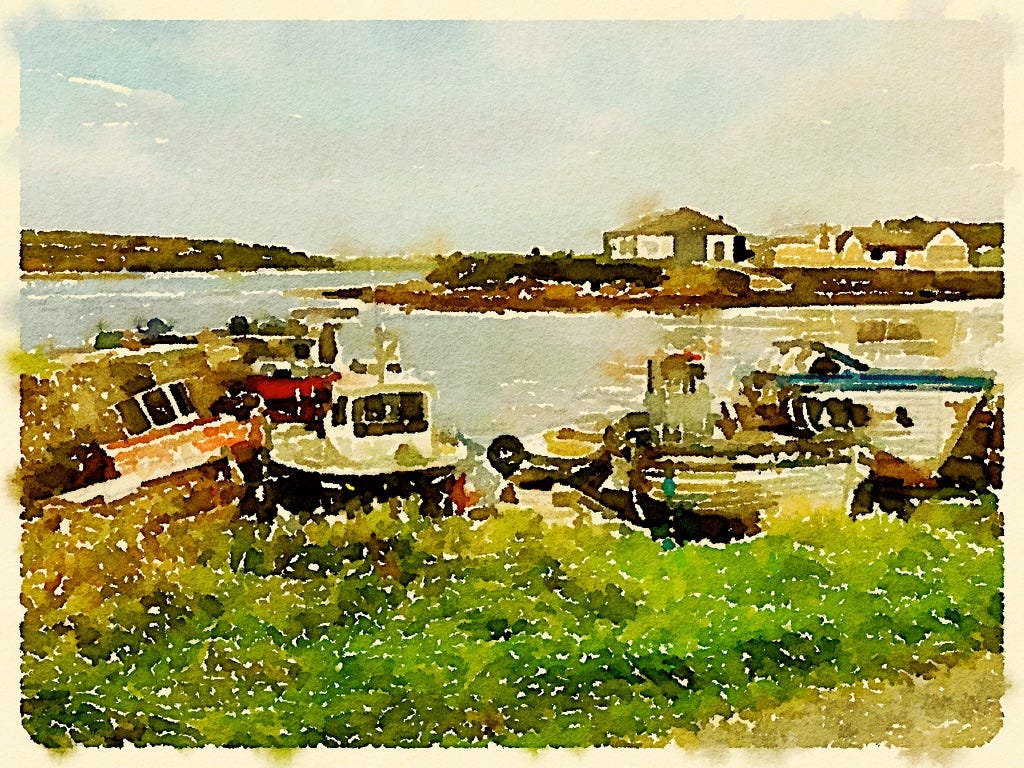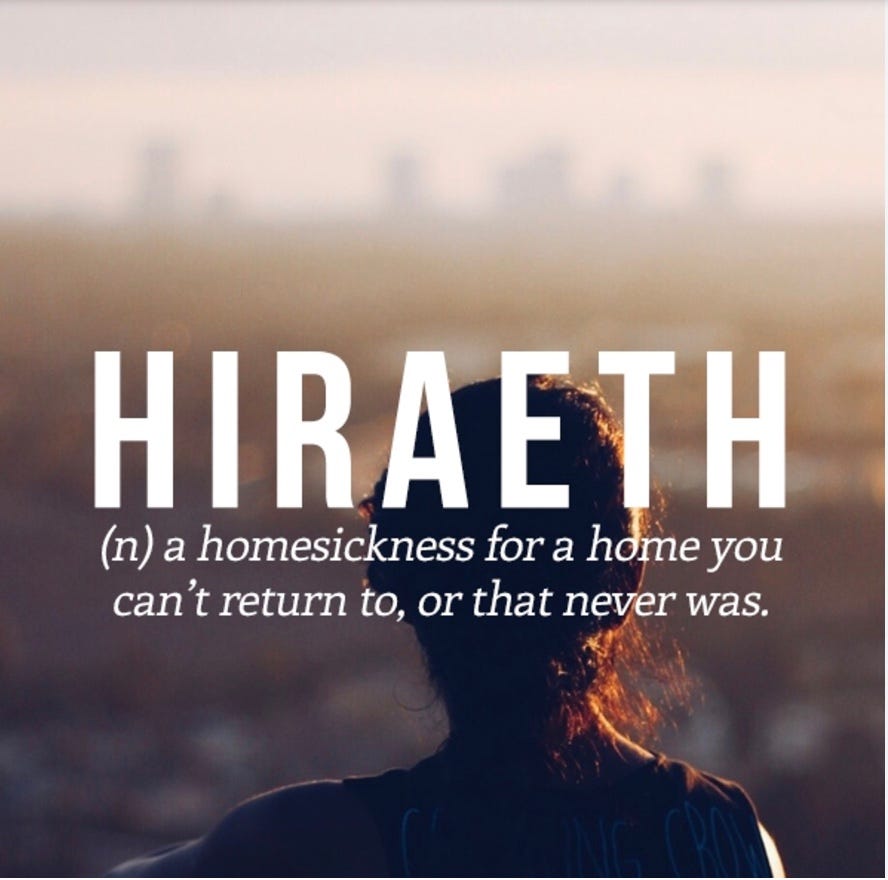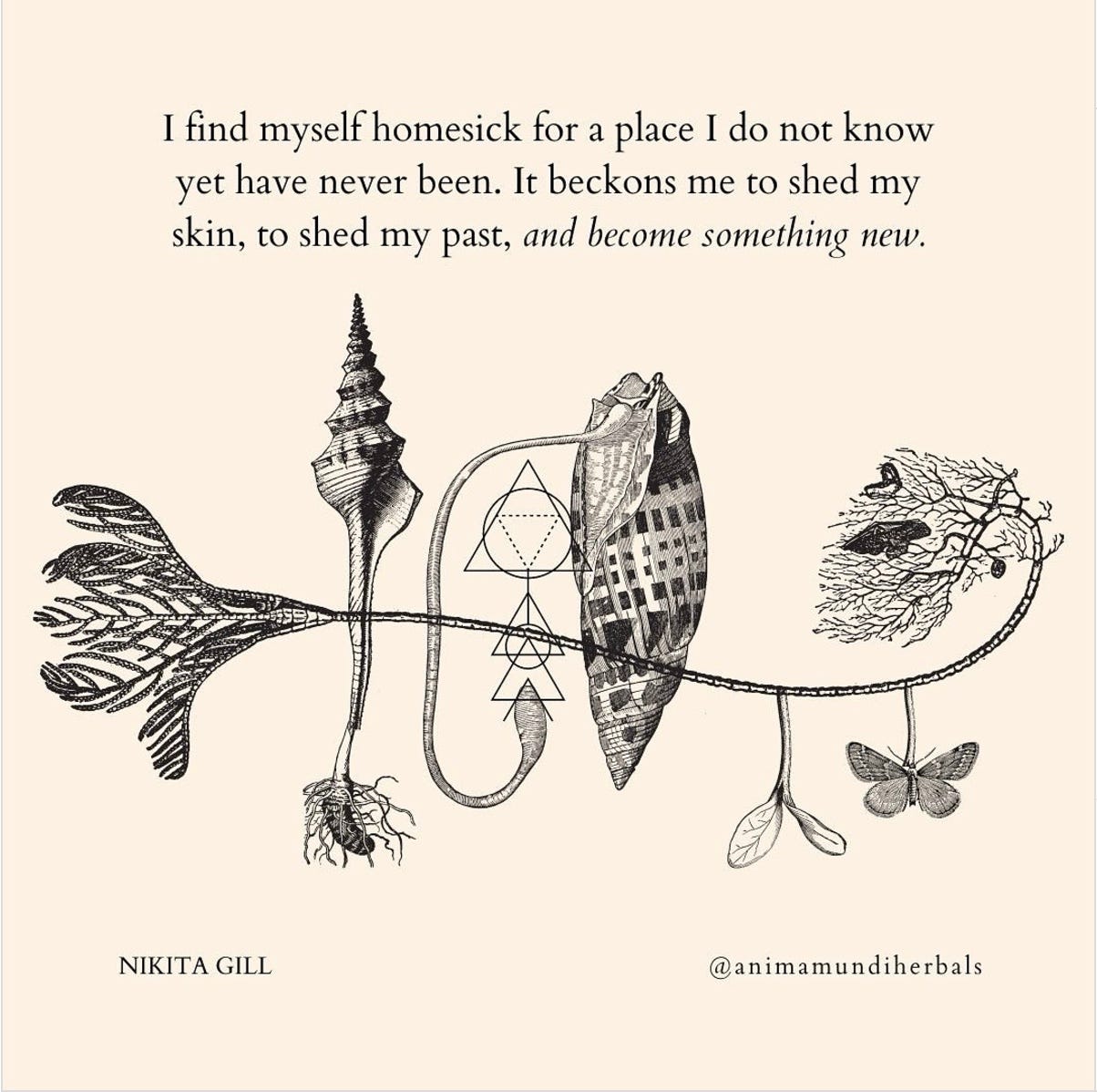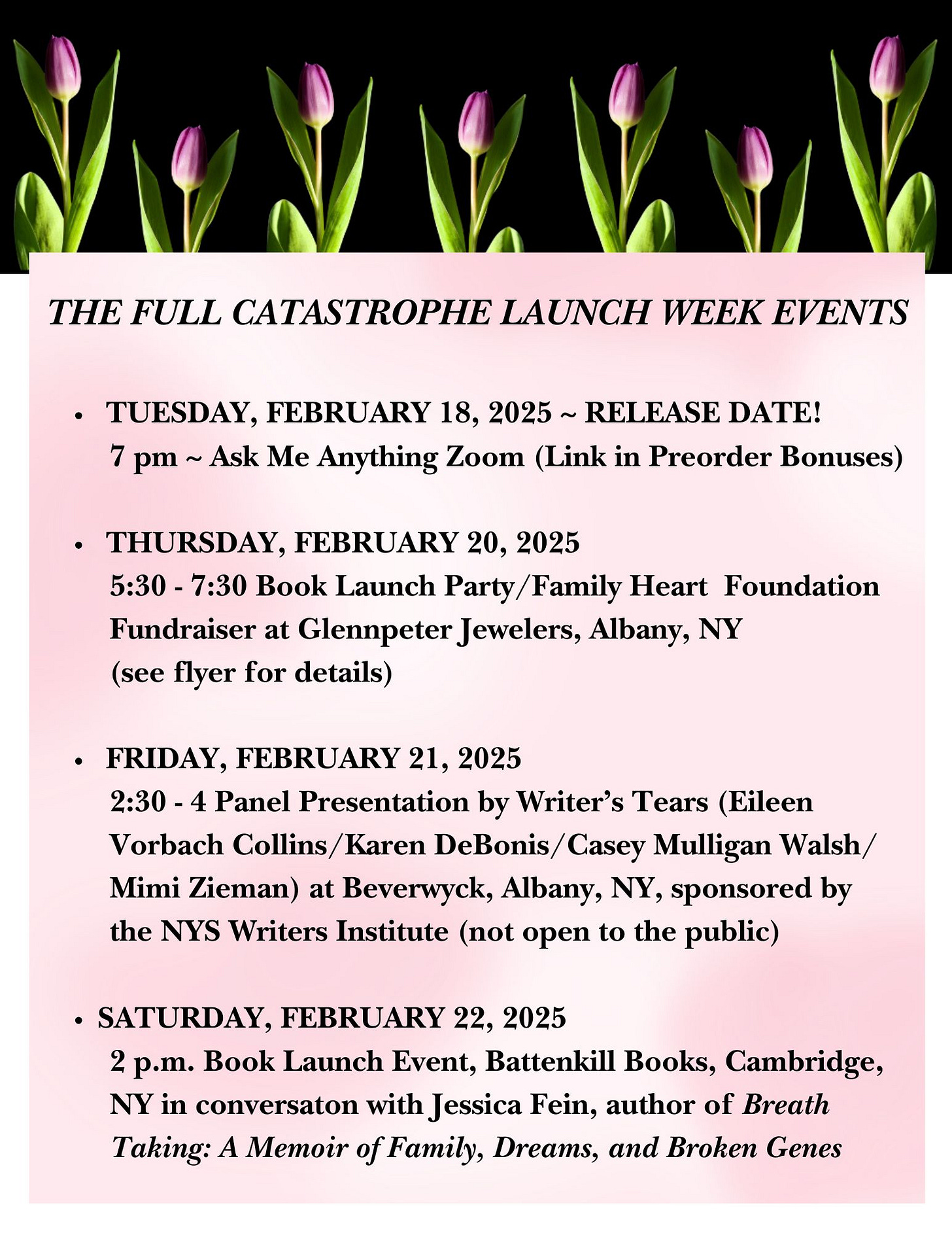Hireath and Heart Health—All Part of Life's Full Catastrophe
The LA wildfires have added a new word to my lexicon, and life continues to bring "the full catastrophe" with all its struggle and joy. Also: One month till book launch! Be still my heart.
Grange, County Sligo, Ireland, September 2017 (edited with Waterlogue)
Welcome to all my recent subscribers. I’m honored to have you here. Many of you have found me through our new literary magazine, IN A FLASH, or maybe you’ve read an Advanced Reader Copy of my forthcoming memoir, The Full Catastrophe: All I Ever Wanted, Everything I Feared, and if I haven’t said it enough, I’m beyond grateful for your support.
Inspiration Everywhere
As my memoir makes its way into the world in ONE MONTH FROM TODAY (what?!), I’m constantly learning words, concepts, and philosophies that are new to me, relate to my story, and resonate deeply.
This week, I learned about the concept of “hireath” (pronounced “here-ayeth”). I’m not sure how I made it to 70 years old without ever having heard this term of Welsh origin. My mother was Welsh, but it’s unlikely, even if she’d lived beyond my thirteenth birthday, that this word was enough a part of her vocabulary for her to have taught it to me. Instead, a dear writing friend tossed it into conversation the other day as we discussed the ambiguous and disenfranchised grief so many of us who live far from the danger zone are experiencing in relation to the horrific wildfires in California and the destruction they’ve caused.
Most of us have difficulty wrapping our minds around the depth of loss and devastation for Southern California residents. Here one moment, gone the next were not only material possessions (clothing, furnishings, vehicles, in most cases literally all of it) but the things that bind us to our past—photos, mementos, the items we hold so dear that make up a life. For those experiencing this monumental loss, deep grief for the tangible things that have been lost sits beside grief for the past and the future they represented.
Because of our empathy for those directly affected by the fires, it’s easy to feel guilty when our own feelings of loss creep in. Who are we to feel grief over places we can never return to, a life we may have had at some point but left for one reason or another that is now lost to us forever, when so many have lost everything?
“It is a kind of disenfranchised grief or maybe ambiguous loss,” said my friend, who had spent a large part of her adult life in LA. “It’s a hiraeth — a longing for something that doesn’t exist.”
And down the rabbit hole I went. Yes, I love words, but it was more than that. My memoir is, at its heart, about the search for home, one I never really had, one that had been slipping away from my earliest memory, one I could only inhabit in my mind, where parents weren’t sick and there were no constant moves, where each family member felt safe and secure. It’s about that undefinable absence I fought long and hard to fill.
As it turns out, eight or more language have a word for this feeling, which “speaks to a deep longing for home and its remnants of a time passed, a place lost, or perhaps never been to.” Author Val Bethell describes it best as:
“The link with the long-forgotten past, the language of the soul, the call from the inner self. Half forgotten—fraction remembered. It speaks from the rocks, from the earth, from the trees and in the waves. It’s always there.”
Lily Crossley-Baxter, writing for BBC, describes a “pull on my heart” that occurs when she thinks of Wales, her place of birth, having lived in Japan for many years. “Deeply connected but not tied to Wales itself, the feeling is a longing for something greater than a spot on a map.” She delves deeply into Welsh history and its people’s stigmatization by British Imperial Rule, “simultaneously dismantling an entire culture while glorifying a romanticised past,” which make hireath such a deeply ingrained part of their experience.
“[Hireath] combines elements of homesickness, nostalgia and longing. Interlaced, however, is the subtle acknowledgment of an irretrievable loss—a unique blend of place, time and people that can never be recreated. This unreachable nature adds an element of grief, but somehow it is not entirely unwelcome.”
I have no words of wisdom to add here, other than to say that this longing may exist in all of us, and that in many cases it motivates us to create for ourselves that thing we most need.
But more importantly, this is a reminder that comparison is useless in grief. We grieve for the friends and strangers who have years of physical and emotional rebuilding ahead, donate as we are able and offer ourselves in any way we can, resolving not to forget them as the embers die and we, at this moment the lucky ones, move forward in our lives. Yet we may carry our own grief, too, for a place we can now never return to, for memories that can never be recaptured, a longing for something unreachable. As always with grief, it’s not either/or, it’s both/and.
We must honor it all.
News of the Day
Welp, best laid plans and all that. On the Saturday before Christmas, my husband and I hopped on a train to NYC for a weekend of holiday fun, but the universe had other plans. Instead of taking photos of the tree at Rockefeller Center and seeing Hamilton (take two), I ended up enjoying the sights at NYU Langone (best hospital experience ever) with a mild heart attack, angiogram, and cardiac ablation.
But is this a sad story? No! The ablation corrected my long-standing arrythmia for good, and thanks to early diagnosis and consistent treatment of familial hypercholesterolemia (FH) nearly fifty years ago (my regular readers knew where this was going already), my arteries were in way better shape than anyone had expected. I arrived home late on Christmas eve in better health and also feeling much more positive about my overall cardiovascular health.
Thanks to the work of the Family Heart Foundation, more and more people are receiving diagnoses at a young age, though the numbers who have this common genetic disorder and don’t know it remain alarmingly high.
Please, please, know your LDL and heart-related family history. And ask your physician to also test your Lp(a). You could prolong a life—yours or your loved ones’. “Runs in the family” is not a diagnosis and won’t get you the lifesaving treatment you need.
BOOK NEWS: The Full Catastrophe preorders are available now, and the book will be available one month from today!
Links to all the vendors that accept preorders can be found here. I’ve recently learned that it’s best to order on Amazon ON LAUNCH DAY (2/18/25), but honestly, preordering from any outlet is also fabulous…better to preorder now than to forget on February 18th. If you’ve already preordered, a huge thank you!
Also: All orders placed at Battenkill Books will be fulfilled with a signed copy.
If you’ve preordered (or when you do), be sure to complete the form to receive three preorder bonuses, including a link to the Ask Me Anything Zoom call on launch day. And if you plan to order from Amazon on launch date, just enter “00000” in the order # space on the form.
Here’s the schedule for launch week. Please get in touch if you have any questions:
For folks within driving distance of Albany—I would LOVE to see you at this event. Please RSVP ASAP, but by 2/6/25 at the latest.
And here’s a link to the book event at Battenkill Books on Saturday, February 22. If you live in or near Cambridge, I’d be excited (and honored) to see you there. The Full Catastrophe is set in Cambridge, and as I say in the book, “I was more at home in the rolling green hills of the Cambridge Valley than I’d ever been anywhere else. Cambridge will always be my hometown.” Truth.
That’s all for now. Thank you so much, each of you, for reading this far, for sharing, and for joining this growing community of folks who believe in the importance of holding each other up through all life throws our way. As the sticker on my car’s rear window proclaims, “You Matter.”
If your LDL-C cholesterol is over 190, doesn’t change with lifestyle modifications, and you have a family history of early heart events, you could have FH. And ask your physician to test your Lp(a) (say it: “L-P-little a”), since it’s elevated in 1 in 5 individuals yet is hardly ever checked. Feel free to get in touch—
In a Flash opens for submissions on the theme of GROWTH fro February 1 - 15. If you’re a flash cnf writer, we’d love to see your work in our queue.
Remember those who have lost so much in the Southern California wildfires. Their grief is deep and will linger long after the news cycle moves on. And while you’re at it, be kind to yourself. All grief is valid. Yours, too.
Till next time,












I love this new word. And so glad to hear you’re okay!
Hireath. A new word for me, but for a feeling that's so familiar. Can't wait to see you next month and help you celebrate The Full Catastrophe.